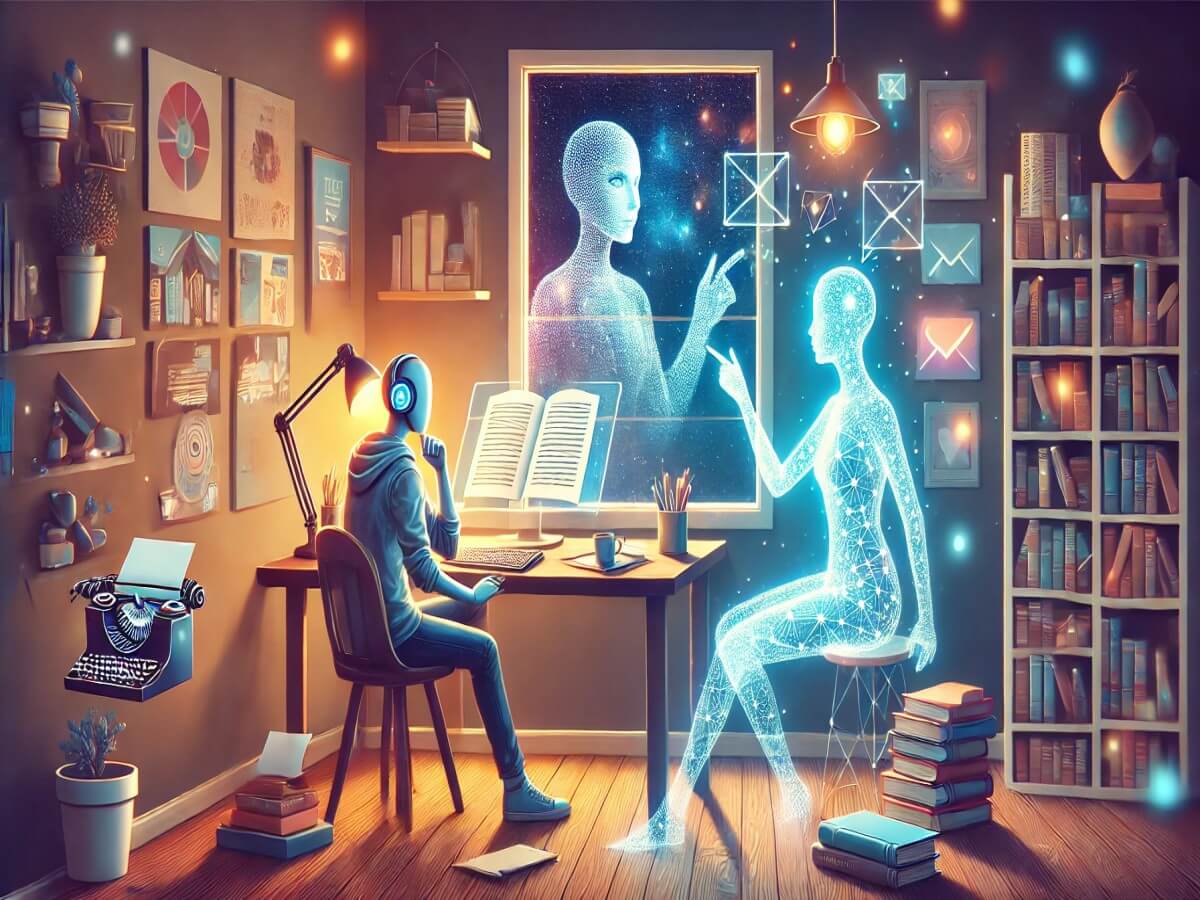
An imaginative illustration depicting a writer working alongside an AI assistant.
Image Generated by OpenAI’s ChatGPT
How to Use AI as a Writing Partner
Spoiler alert: AI is a creative tool rather than a creator. While it excels at generating blog posts and crafting compelling essays, it struggles with writing novels. Why? Because novels demand sustained narrative depth, emotional nuance, and an understanding of human complexity—areas where AI’s current technology falls short. Advancements like quantum computing may one day bridge this gap. Still, for now, the art of novel writing remains a uniquely human domain.
When I wrote my first published novel, generative AI became my indispensable collaborator. We brainstormed ideas, structured outlines, refined wording, and polished drafts. It was an adventure, and having a partner to bounce ideas off—one who always provided constructive feedback—made the process both productive and deeply rewarding.
Why AI Struggles with Novels
AI’s strengths lie in pattern recognition and quickly processing vast data. This makes it great at tasks like generating coherent sentences, mimicking writing styles, or proposing plot twists. However, writing a novel requires more than connecting the dots. It demands understanding the intricacies of character arcs, weaving subtle themes, and maintaining emotional resonance across hundreds of pages—skills that require human intuition and creativity.
For example, while AI can suggest natural dialogue, it often misses the subtext and emotional weight needed for pivotal scenes. This is where the human writer takes AI’s suggestions as a springboard and crafts them into something uniquely their own.
How AI Enhanced My Writing Process
- Idea Generation: AI was instrumental in helping me overcome writer’s block. By prompting it with themes or character traits, I received dozens of suggestions that sparked new directions for my story. Some ideas were discarded, but others became key elements in my narrative.
- Outlining and Structuring: Crafting a cohesive outline can be daunting, especially for a novel. AI helped me experiment with different story structures—classic three-act arcs, nonlinear timelines, and even unconventional formats. This collaboration ensured I had a solid roadmap before diving into the writing process.
- Refining Dialogue: Dialogue is an area where AI surprised me. While it couldn’t always capture subtle emotional undertones, it provided clean, functional drafts that I could fine-tune. It helped speed up the process by giving me a starting point to build on.
- Editing and Polishing: Editing is where AI truly shines. It caught grammatical errors, suggested rephrased sentences for clarity, and even flagged overused words or phrases. While I didn’t accept every suggestion, these edits helped me tighten my prose and maintain a consistent tone.
- Feedback and Revisions: The best part of working with AI was its consistency. AI never tired of reviewing passages or offering alternatives, no matter how often I returned to the same section. This allowed me to iterate quickly and refine my story without burning out.
- Ensuring Original Content: Using AI to identify plagiarism guarantees that each chapter’s content is original. It helps prevent the accidental appropriation of ideas from other authors.
The Benefits of Collaboration
Using AI felt like having a brainstorming partner who was always available and supportive. It gave me a sense of momentum, especially when self-doubt crept in. However, the key to making the partnership work was maintaining creative control. AI could suggest, but it was my role to decide what fits the vision of my story. This sense of partnership can be a comforting presence in the often solitary writing world.
Tips for Writers Interested in Using AI
- Be Specific: Provide clear prompts and detailed context when working with AI. The more specific your instructions, the better the results.
- Experiment Freely: Don’t be afraid to ask AI for unconventional ideas or explore genres you’ve never tried.
- Use AI as a Guide, Not a Boss: Remember, AI is a tool to enhance your creativity, not replace it. Use its suggestions as inspiration, but trust your instincts as a writer.
- Iterate and Adapt: Writing is a process. Treat AI’s output as a first draft, and be prepared to revise and adapt as you go.
Final Thoughts
AI is an incredible tool for writers, offering support and inspiration throughout the creative process. While it may not yet rival human creativity in crafting novels, it can potentially revolutionize how we approach storytelling. Using AI as a writing partner wasn’t just a practical choice—it became a key part of my journey as an author. If you’re curious about how AI can enhance your writing, I encourage you to try it. Who knows? You might find a collaborator who sparks your imagination and helps bring your next great story to life.
Do you have questions? Please feel free to contact me; I will be happy to discuss this in more detail with you!